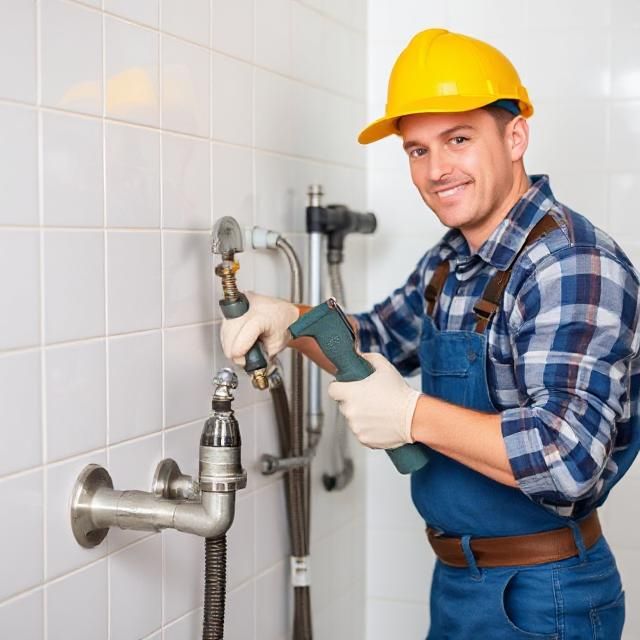Beneath every Cranbourne office block and café lies a labyrinth of pipes and valves the unsung circulatory system of your business. Commercial plumbing services keep this network flowing, ensuring a dripping tap doesn’t become a flooding fiasco. As one expert notes, commercial plumbing is often overlooked, yet it’s “a fundamental aspect of maintaining a safe, efficient, and productive commercial environment”. In other words, when you own a business, keeping your pipes in good nick is just as crucial as any other system. These nine tips will help you choose, maintain and manage commercial plumbing services like a pro, so your Cranbourne business never skips a beat.
Get to Know Your Pipes Like a Local Legend
Every building has a personality, and so does its plumbing. Before calling in the cavalry, get familiar with your system’s layout where the shut-off valves are, which areas get heavy use, and any problem spots that flare up like clockwork. Knowing the quirks of your setup helps you explain issues faster to professionals and avoid unnecessary delays. After all, the best commercial plumbing services in Cranbourne don’t just fix pipes they build a game plan around your property’s unique plumbing story.
1. Know What Makes Commercial Plumbing Services Special
Commercial plumbing isn’t just “big home plumbing.” It’s designed to handle heavy usage, think dozens of toilets, sinks, and floor drains running all day. Commercial buildings have much higher water demand and more complex systems than a house. For example, a café kitchen needs grease traps and floor drains; an office block has high-capacity water mains and booster pumps; a hospital may need sterile water lines and massive hot-water boilers. These systems work under pressure and scale that residential pipes simply can’t. They also fall under stricter health and safety codes.
| Feature | Residential Plumbing | Commercial Plumbing |
| Usage & Scale | Serves a single home | Serves many users/floors |
| System Complexity | Simple network, basic fixtures | Complex networks with grease traps, multiple heaters, pumps |
| Regulation & Compliance | Basic building code requirements | Strict codes, backflow testing |
| Maintenance Needs | Occasional repairs | Regular inspections & preventive upkeep |
Because commercial work is on a larger scale, specialist commercial plumbing services are essential. Don’t assume a residential handyman can handle a busy shop or office. This difference is why many Cranbourne businesses schedule dedicated commercial plumbing plans – it’s about keeping performance high and compliance met.
2. Hire Licensed, Experienced Pros
In Victoria, only a licensed plumber can legally work on commercial systems. In fact, the National Construction Code says you must comply with the plumbing code when designing, installing or repairing plumbing systems. That means you need a credentialed pro. Always check licenses and memberships, and verify they know local regs. A good tip: ask for examples of similar commercial jobs they’ve done in Melbourne’s south-east .
A qualified commercial plumber will also carry insurance and use certified materials . They should provide transparent quotes and explain options. For instance, they might recommend stainless-steel pipes for longevity or show compliance certificates. Treat this like hiring any specialist looking for reviews or testimonials from other businesses. A reliable plumber shouldn’t be the cheapest “sparky” you find; think of them as a partner in preventing disasters.
3. Schedule Regular Inspections and Maintenance
Preventive care is the cornerstone of commercial plumbing. Routinely inspect your pipes, drains and fixtures at least twice a year. Licensed commercial plumbing contractors can spot hidden leaks, corrosion or code issues before they bite you on the backside. For example, they’ll test water pressure consistency, examine underground piping, and verify that backflow prevention devices work correctly.
- Basic checks: Leaks, rust build-up, loose joints, poor insulation.
- Pressure tests: Ensure boilers, pumps and valves hold safe pressure.
- Drain camera scans: Catch blockages or cracks out of sight.
A maintenance visit often includes cleaning filters, lubricating valves, and flushing systems. It sounds dull, but it saves a fortune in emergency repairs. As one guide puts it, a maintenance schedule “can reduce insurance risk, prolong asset life, and prevent unplanned business interruptions”. Think of it like a health check-up for your building – a small investment that keeps everything flowing smoothly.
4. Prevent Clogs with Professional Drain Cleaning
Clogged drains are the bane of any business a grease build-up or toilet block can shut down a café or stall a hotel. Don’t wait for that gurgling panic. Install strainers or grease traps, educate staff on what not to pour down sinks, and book routine drain cleaning with your plumber. Commercial plumbers have special tools like hydro-jetting and CCTV cameras to clear and inspect large-diameter drains.
- Enzyme cleaners: Use eco-friendly enzymes monthly to break down organic gunk.
- Grease trap schedule: Empty kitchen traps regularly to avoid nasty build-ups.
- Root intrusion checks: If your building has trees nearby, roots can crack sewer lines.
Many businesses set annual “drain flush” dates on their calendar. This proactive step keeps traffic flowing and odours at bay and it’s way cheaper than a call-out to unclog the toilets during your busiest season.
5. Monitor Water Pressure and Usage
Water pressure spikes or drops in a commercial setting can signal trouble. High pressure stresses joints and taps; low pressure could mean a leak or failing pump. Install a pressure regulator and track your water meter. Unexplained jumps in usage often hide hidden leaks.
- Pressure relief valves: Test and set these on boilers and pumps to safe levels.
- Sub-metering: In big buildings, install meters for different zones to pinpoint issues.
- Billing alerts: Keep an eye on water bills. A sudden rise is a red flag.
Also consider water-efficient fixtures: dual-flush toilets, low-flow taps and sensor faucets. Over time, these reduce costs and the load on your system. As M1 Plumbing notes, closely watching water use “improve sustainability, a growing priority for modern businesses”. In short, managing pressure and consumption saves money and helps the planet.
6. Maintain Hot Water and Special Systems
Many Cranbourne businesses rely on hot water. Commercial hot-water systems require attention. Sediment buildup, faulty controls or corroded tanks can cause breakdowns – and even health hazards like Legionella. Keep on top of these:
- Tank flushing: Sediment settles in storage tanks. Have a plumber flush it out yearly.
- Safety checks: Test temperature controls, pressure relief valves, and anti-scald devices regularly.
- Leaks & rust: Inspect valves, fittings and anode rods for wear. Replace corroded parts promptly.
- Special inspections: If you have a large boiler, it may need certified servicing or pressure vessel checks by law.
Failing water heaters can halt business. Commercial contractors often bundle water heater maintenance in a plan. A good tip: schedule this with other inspections to save time and downtime. That way you fix small issues before they overflow into a cold shower crisis.
7. Plan for Emergencies with 24/7 Support
No matter how diligent you are, plumbing emergencies can still happen – and usually at the worst time. Make sure your plumber offers 24/7 emergency service. Post their after-hours number by the phone, and label your main water shut-off valves clearly. Train someone on staff how to turn the water off in a crisis.
- Emergency shutoff: Know exactly where and how to shut off water to kitchens, toilets, etc.
- Backup plan: Keep a small stock of common parts if you have in-house maintenance staff.
- Rapid response: A local Cranbourne plumber can often respond faster than one from downtown Melbourne.
Quick action can be the difference between a minor leak and a flooded workspace. As one expert points out, 24/7 emergency response ensures “rapid intervention minimised business disruption”. In other words, having a reliable commercial plumber on speed-dial isn’t being paranoid, it’s being smart.
8. Use Quality Parts & Embrace Efficiency
Commercial systems run hard, so invest in quality materials. Use certified, industrial-grade pipes and fixtures cheap knockoffs corrode faster under heavy use. For example, copper or stainless steel is often worth the extra cost for longevity and hygiene. Ensure any new installations carry the required Australian WaterMark certification.
Also, make your plumbing lean green: install sensor taps, dual-flush toilets and water-efficient appliances. Not only do these save water and cut bills, they can improve your business’s green credentials. Some landlords or councils even reward efficiency upgrades. For hot water, consider solar pre-heaters or heat-pump units if appropriate. Modern commercial plumbers can advise on sustainable options. It’s a trend in Australian commercial plumbing to cut waste and costs.
9. Build a Long-Term Partnership with Your Plumber
Finally, think of your commercial plumber as a business ally rather than a one-off fixer. Having the same trusted team service your property means they get to know its quirks and history. Many contractors offer service agreements or maintenance plans, which spread costs and guarantee priority service. As a VIP Plumbing guide notes, a maintenance plan “reduces insurance risk, prolongs asset life, and prevents unplanned interruptions” a huge win for any property manager.
Choose a local Cranbourne or SE Melbourne firm that’s known and reviewed. An experienced outfit will understand your local water quality, council regs, and the area’s most common plumbing headaches. Check that they carry public liability insurance and offer clear, written contracts. Over time, this partnership pays off: fewer surprises, better pricing on repeat work, and a plumber who’ll honestly flag any issues small or large before they become catastrophes.
Conclusion
Keeping your business running means keeping your plumbing running. By following these tips from regular inspections to choosing the right licensed team – you’ll ensure your Cranbourne property’s pipes stay trouble-free. Plumbing Industry Commission of Victoria A stitch in time saves nine: proactive care avoids emergencies, keeps customers happy, and protects your bottom line. Don’t wait for a leak to strike; reach out to a professional commercial plumbing service today for an assessment or maintenance plan. Your business will thank you.ummer. And hey, if you’d rather not get your hands dirty, book a licensed technician today and let them work their magic. Stay cool, Perth!

